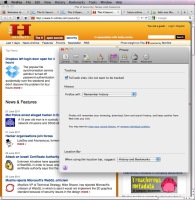 As expected, the Mozilla Project has released version 5.0 of Firefox. The update to the open source web browser comes just three months after the project's last major version, Firefox 4.0, which suffered a number of delays – Mozilla has adopted a version model similar to that used by Google for its Chrome browser.
As expected, the Mozilla Project has released version 5.0 of Firefox. The update to the open source web browser comes just three months after the project's last major version, Firefox 4.0, which suffered a number of delays – Mozilla has adopted a version model similar to that used by Google for its Chrome browser.One of the most important additions in Firefox 5 is support for CSS animation, a feature that browsers such as Safari have offered for some time. When creating a CSS animation, a developer specifies the animation's duration and name in the CSS rules for the HTML element in question. The
@keyframes selector associated with this name is followed by the rules that describe the element's beginning and end points as well as optional intermediate stages.
In Firefox 5, the Do-Not-Track header preference has been moved to increase discoverability  The Do-Not-Track header preference has been moved "to increase discoverability". On Windows, it can be found under "Tools->Options->Privacy", while on Mac OS X, it is under "Firefox->Preferences->Privacy". This preference allows users to tell web sites that they don't wish to have their browsing behaviour tracked. Whether a site respects this or not is up to its developers.
The Do-Not-Track header preference has been moved "to increase discoverability". On Windows, it can be found under "Tools->Options->Privacy", while on Mac OS X, it is under "Firefox->Preferences->Privacy". This preference allows users to tell web sites that they don't wish to have their browsing behaviour tracked. Whether a site respects this or not is up to its developers.
Other changes include improved canvas, JavaScript, memory, and networking performance, as well as updated standards support for HTML5, XHR, MathML, SMIL and canvas. The "desktop environment integration for Linux users" has also been improved. Introduced in previous Firefox Beta updates, the Firefox development channel switcher has been removed.
The mobile version of the web browser has also been updated: Firefox 5 for Android is now capable of sending the Do-Not-Track (DNT) header – the developers say that it is "the first mobile web browser" to offer such a feature. It adds support for IPv6, "overflow: scroll" and "overflow: auto" CSS properties, Restartless Add-ons and HTML5 online/offline events. Users can download the release from the Android Market.
More details, including a list of known issues, can be found in the release notes. Firefox 5.0 is available to download for Windows, Mac OS X and Linux from the project's web site. Alternatively, users can upgrade to the new versions, either by waiting for the automated update notification or by manually selecting "Check for updates" from the Help Menu. Mozilla encourages users to upgrade to the latest releases as soon as possible.
Firefox binaries are released under the Mozilla Firefox End-User Software License Agreement and the source code is released under disjunctive tri-licensing that includes the Mozilla Public License, GPLv2 and LGPLv2.1.
Update: Firefox 5 also addresses a number of security holes in the browser, five of which are rated as "Critical" by Mozilla.



No comments:
Post a Comment